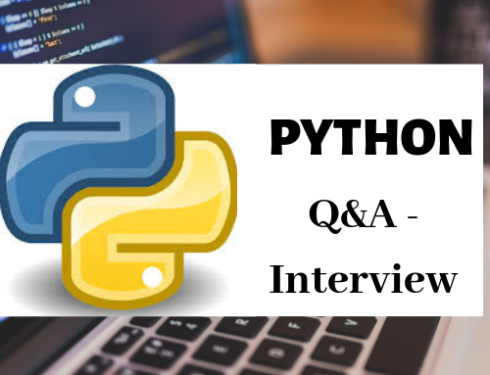
Python has progressed toward becoming a significant famous language for endeavors and the improvement of value extends as of late.The language is versatile and is used for application development, writing scripts for desktop programs and in the configuration of servers to name a few. With so much of use, language has generated numerous job opportunities. Freshers looking to face the Python interviews need to have a clear understanding of Python basics. To help learners with that, we are listing the most frequently asked interview questions in Python Basics.
Python Certification is the most looked for after expertise in programming space. In this Python Interview Questions blog, I will acquaint you with the most much of the time made inquiries in Python interviews. This blog is the ideal guide for you to get familiar with every one of the ideas required to clear a Python meet. Our Python Interview Questions is the one-prevent asset from where you can help your meeting readiness.
Python Interview Questions
1. What is Python?
Python is an interpreted language which means we don’t need to compile Python codes before it is run. PHP and Ruby are some of the other interpreted languages.
Few features of Python are:
2. What is the scope of multi-threading in Python?
Python doesn’t allow a complete multi-threading solution. Python’s construct Global Interpreter Lock (GIL) makes sure that only one thread is executed at any point in time. Threading library in Python doesn’t allow the use of any extra CPU cores. Though multi-threading can be done by the OS or external tools like Spark or Hadoop.
3. What is monkey patching?
Monkey patching is changing the behaviour of a function or object after it has already been defined.
4. What do *args and **kwargs mean?
These are identifiers and the terms *args and **kwargs are a convention.
We use *args when we aren’t sure of the number of arguments will be passed to a function, or on the off chance that we need to pass a stored list or tuple of arguments to a function.
**kwargs is used in cases where we are not sure about the number of keyword arguments will be passed to a function, or it very well may be utilized to pass the values of a dictionary as keyword arguments.
5. What are @classmethod, @staticmethod, @property?
These are decorators.
Decorators are a special kind of function that either takes/returns a function or a class. These are used on functions defined within classes. The @ symbol makes it easy to read.
6. How does Python garbage collection mechanism work?
7. What are the built-in data-types in Python?
Built-in datatypes in Python are of two types.
Immutable
Mutable
8. What do you understand by Python Package?
Python package is the collection of modules that are used to structure the module. It uses a dotted module nomenclature.
9. What’s the difference between lists and tuples?
| Tuples | Lists |
| Tuples are Immutable just requiring less memory | Lists are Mutable and thus requires more memory |
| Tuples are faster compared to Lists | Lists are slower that tuples |
| Tuples are heterogeneous data structures | Lists are homogenous sequences |
| Tuples have structure | Lists have order |
| We use parenthesis () to construct tuples | We use parenthesis we use square brackets [ ] to get a new list |
10: Why And When Do You Use Generators In Python?
A generator in Python is a capacity which restores an iterable article. We can iterate on the generator object utilizing the yield keyword. In any case, we can just do that once in light of the fact that their qualities don’t continue in memory, they get the qualities on the fly.
Generators enable us to hold the execution of a capacity or a stage as long as we need to keep it. Be that as it may, here are a couple of precedents where it is gainful to utilize generators.
We can supplant circles with generators for productively figuring outcomes including expansive informational indexes.
Generators are helpful when we don’t need every one of the outcomes and wish to keep down for quite a while.
Instead of utilizing a callback work, we can supplant it with a generator. We can compose a loop inside the function doing likewise as the callback and transforms it into a generator.
Conclusion
These Python interview questions are internationally limited to basics and are targeted towards freshers. Answers are more of explanatory so that learners get to understand the basics in a detailed manner. In technical interviews, learners are supposed to showcase their understanding while keeping the answers to the point and these questions are supposed to cater to that. NearLearn wishes very good luck for your interviews.
Visit more for
Python training in bangalore
Blockchain training in bangalore
machine learning training in bangalore
Powered by "WordPress" Theme: powered by:WordPress Design By "WordPress"